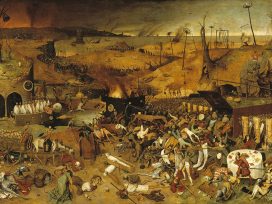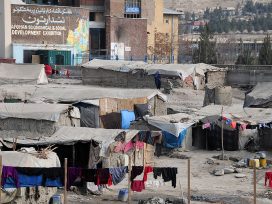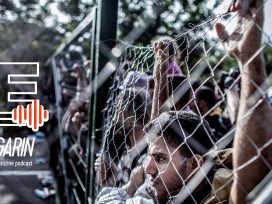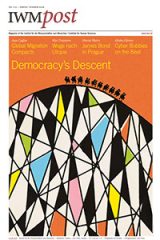

In collaboration with
Institute for Human Sciences
The Institute for Human Sciences / Institut für die Wissenschaften vom Menschen (IWM) is an independent institute for advanced study in the humanities and social sciences. Since its foundation in 1982, it has hosted more than 1500 scholars, journalists and translators from all over the world. Many of the Institute’s Permanent and Visiting Fellows are regular contributors to Eurozine or its focal points The World in Pieces and Ukraine in European Dialogue (see below).
Website: www.iwm.at
X (formerly known as Twitter): https://x.com/iwm_vienna
Youtube: https://www.youtube.com/channel/UCIwFQ_iRX8w8D0NKJo41Ihw

Articles

War becomes the twin of communication: the development of media has not only changed how warfare is reported, but also how it’s fought. The working rule of the warriors is to spread strategic information and disinformation at every instant. And media workers are culpable too, for abusing the genre of breaking news reporting to magnetise audiences and advertisers, doing it at a great symbolic cost.

In true Stalinist manner, Russian culture is being weaponized in the war against Ukraine. But instead of cancelling Russian writers, should we read them with a critical eye – just like other European classics?

Life as death
How Afghan refugees aren’t offered real solutions
More than half a million Afghans were displaced in 2021, adding to many more forced to flee over decades of uninterrupted violence. But offers to accommodate Afghanistan’s ‘living dead’ are often conditional on obscure definitions of neediness.

Europe is facing a demographic crisis, resulting in suffocating labour shortages, and yet incoming migration is more and more rejected in mainstream politics. Can the EU come to terms with this great contradiction without an implosion?
Focal points

Inspired by a lecture that Clifford Geertz delivered in 1995 at the Institute for Human Sciences in Vienna, this focal point engages with ‘deep diversity’, ‘a sense of dispersion, of particularity, of complexity and of uncenteredness’ rather than unified world order. It follows the launch of a research programme of the same name at the institute in January 2023.

Post-revolutionary Ukrainian society displays a unique mix of hope, enthusiasm, social creativity, collective trauma of war, radicalism and disillusionment. With the Maidan becoming history, the focal point ‘Ukraine in European Dialogue’ explores the new challenges facing the young democracy, its place in Europe, and the lessons it might offer for the future of the European project.
Projects and publications

